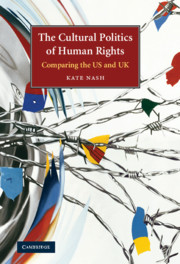Book contents
- Frontmatter
- Contents
- Preface
- List of acronyms used in the book
- Table of cases
- 1 What does it matter what human rights mean?
- 2 Analysing the intermestic human rights field
- 3 Sovereignty, pride and political life
- 4 Imagining a community without ‘enemies of all mankind’
- 5 Global solidarity: justice not charity
- 6 Conclusion
- References
- Index
2 - Analysing the intermestic human rights field
Published online by Cambridge University Press: 27 June 2009
- Frontmatter
- Contents
- Preface
- List of acronyms used in the book
- Table of cases
- 1 What does it matter what human rights mean?
- 2 Analysing the intermestic human rights field
- 3 Sovereignty, pride and political life
- 4 Imagining a community without ‘enemies of all mankind’
- 5 Global solidarity: justice not charity
- 6 Conclusion
- References
- Index
Summary
Considering human rights in terms of a ‘field’ enables analysis of precisely how intermestic human rights are contested and defined and with what effects for global justice in practice. It enables the exploration of conflicts over what human rights are and should be, who has which entitlements, and how these conflicts are to be settled within and across relevant institutional settings. Legitimate conflicts in the human rights field are ended temporarily, if not finally resolved, through authoritative definitions that decide the limits and scope of how they are to be administered. As the result of these contestations is often regulation, policy or law, this understanding of the ‘human rights field’ links micro-social interactions to macro-institutional structures, conflicts over particular human rights cases to fundamental changes in state formation.
AUTHORITY AS POWER: THE INTERMESTIC HUMAN RIGHTS FIELD
Following Bourdieu, a field is a set of regularised social interactions in which the value of what is at stake is shared, and there is competition to gain status, power or material gain between actors properly designated as participants in relation to each other. These actors occupy objective positions in structures of power, with varying amounts of capital (economic, cultural, social) whose possession enables access to the specific profits that are at stake (Bourdieu 1977, 1991, 1992).
- Type
- Chapter
- Information
- The Cultural Politics of Human RightsComparing the US and UK, pp. 30 - 70Publisher: Cambridge University PressPrint publication year: 2009



